American election diaries (2): Project Coconut Tree or: an election in Memes
-
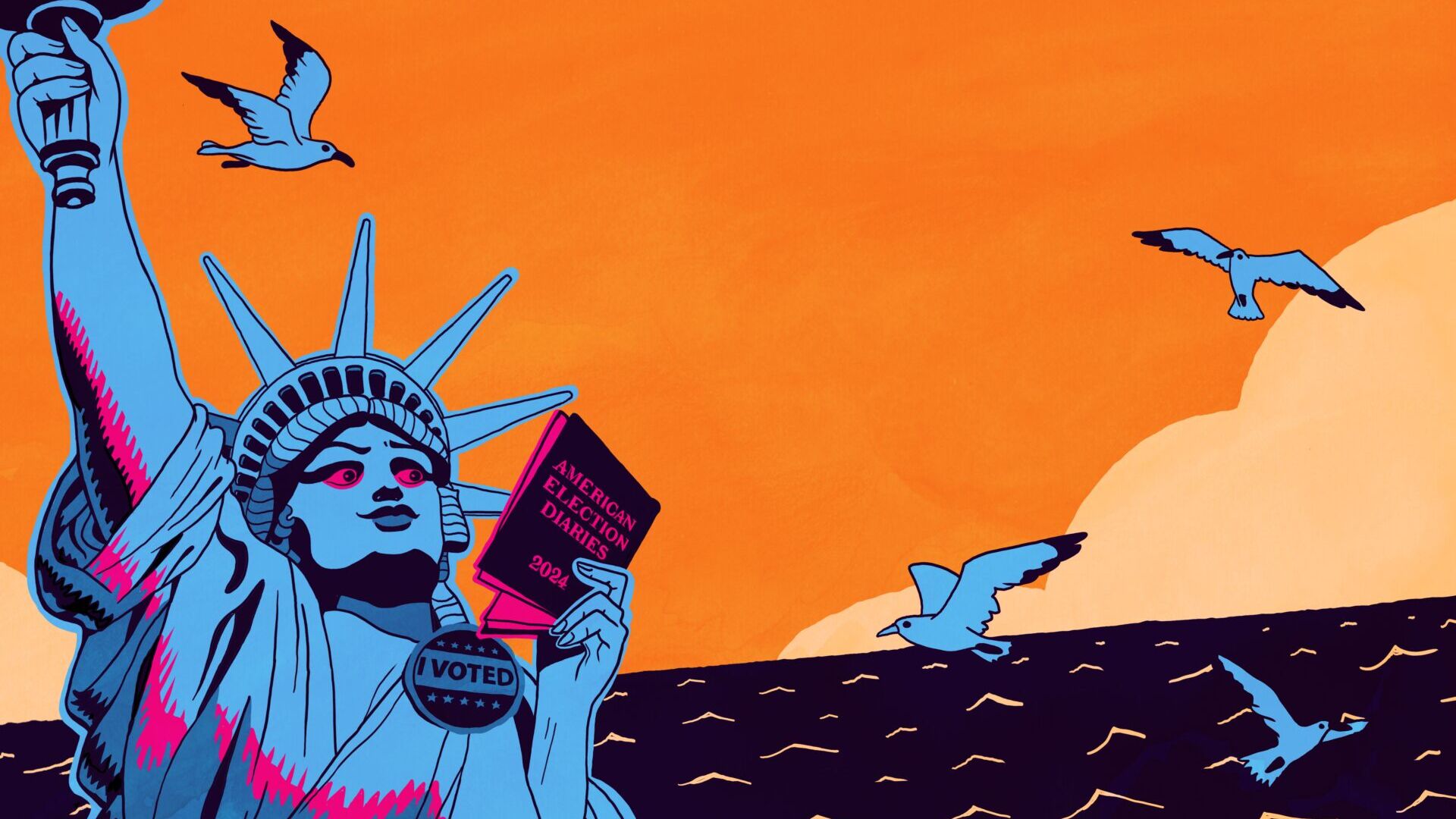 Illustration: Ivana Smudja.
Illustration: Ivana Smudja.
This year, more voters than ever before in history are heading to the voting booths – and no election promises more far-reaching consequences than the one for the next U.S. President. In this Vox series, we take a look at one of the most important elections of 2024. This time: the social media politics that could make or break a candidate.
Voting in America is having its moment. Across the country, billboards and social media posts are reminding citizens to hit the polls next week. And while it’s no secret that people ages 18 to 29 historically don’t turn out in big numbers on election day, after showing up in large numbers in 2020 already, young voters might tip this year’s close race.
And in classic Gen Z fashion, what might really be driving turnout this year could be the incredible role that social media – and memes in particular – have played over the short few months of this campaign cycle. Less than a week away from its conclusion, we take a look back at the 2024 US election and the viral moments it inspired.
Biden’s last hurrah
Though it might feel like years, it was a mere three months ago that Joe Biden dropped out of the 2024 presidential race. An undeniable cause: his performance in the first debate, which sparked a virtual wildfire of memes. During the event, each candidate lobbed insults at the other that fueled social media taglines and audio edits, like Biden’s ‘You have the morals of an alley cat,’ and Donald Trump’s ‘I really don’t know what he said at the end of that sentence. I don’t think he knows what he said either.’ Biden’s blank-faced, open-mouth expression alone was the inspiration for an outpouring of memes.
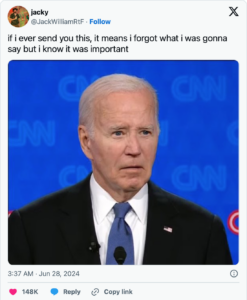
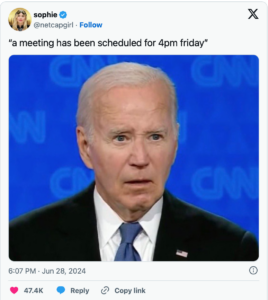
Additionally, those who have ventured into the depths of the internet might remember #Triden edits in the immediate aftermath of the debate – shipping (romantically linking, ed.) Donald Trump and Joe Biden. Something about the elderly candidates bickering over their golf handicaps on national television inspired the creation of an enemies-to-lovers trope among many TikTokers. The result: clips of the candidates interacting with each other set to longing love songs like Chappell Roan’s Casual.
No one is safe (from meme-ification)
Gen Z is a famously unserious group of individuals. It makes perfect sense, then, that the overwhelming generational response to a literal assassination attempt on a former president would be to cope with bizarre internet content. Trump famously covered his wounded ear after the attack in July with a small gauze, prompting his supporters to mimic him with gauzes of their own. Such a scene triggered viral responses like, “When you order a pillow on Temu,” and photoshopping the former president into a menstrual pad advertisement.
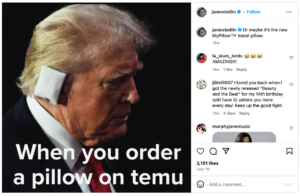
Kamala enters the chat
For years, Kamala Harris has been breaking the internet with one-liners. Whether in the famous video, capturing Harris officially becoming the vice president in the middle of jogging, calling Biden and excitedly exclaiming: ‘We did it, Joe!’, or her infamous ‘Do not come’ response to Guatemala migrants crossing into the US illegally.
But in recent months, something has shifted in Harris’ online persona. Where she has been the butt of the joke in the past, Harris has recently been delivering successful punchlines and starring in TikTok fan edits. Dubbed by social media users as “Project Coconut Tree”, named after Harris’ infamous speech (see box), her ability to reach young people has been bolstered through unprecedented marketing strategies – famously spearheaded by her Gen Z social media team.
Kamala Harris and the Coconut Tree
In May 2023, Harris delivered a now-viral speech at the White House, laughing: ‘My mother would say to us, “I don’t know what’s wrong with you young people. You think you just fell out of a coconut tree?”‘ The Vice President then becomes very serious and continues: ‘You exist in the context of all in which you live and what came before you.’
Online scrutiny immediately followed, poking fun at Harris’ coconut tree allegory, including multiple dubstep productions of the out-of-context quote, spread via platforms like TikTok. In recent weeks, the coconut tree incident has, however, turned from infamy to iconic, with Harris’ team actively embracing the memes surrounding the candidate.
Kamala is brat
Around the same time that Harris accepted the Democratic nomination for presidential candidate, ‘brat summer’ was having its moment. Charlie XCX’s album BRAT was topping charts around the world, widely recognizable through its minimalistic poison-green cover, with the word ‘brat’ on it. What followed was an outpouring of people copying the cover, putting all kinds of words instead of ‘brat’ on the green background. And, after Harris’ accepting of the nomination, Charlie XCX herself tweeted an official declaration (and endorsement) that “kamala IS brat” – in other words: Harris was officially declared cool.
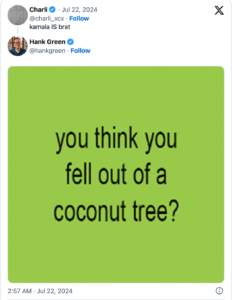
Kamala HQ (Harris’ social media presence, see box, ed.) quickly capitalized on this microtrend by not only putting their videos to trending BRAT songs but also changing their profile picture to the words “kamala hq” on the signature bright green brat album background.
Who is Kamala HQ?
Harris’ social media presence, Kamala HQ, sits at an impressive 5 million TikTok and 1 million Instagram followers. Their content ranges from silly edits of the Vice President to serious criticism of former President Trump. Undeniably, a large contributing factor to their widespread digital reach is the all-Gen Z team’s ability to apply niche and short-lived online trends to their campaign advertising, mixed with more serious political content. This stands in stark contrast to the Trump social media team’s strategy, featuring mostly video clips from the campaign trail.
Donut disasters and childless cat ladies
It’s no secret that the Trump and J.D. Vance campaign has struggled to entice young voters, trailing Harris by over 30 points in voters between the ages of 18 and 31. Despite gaining nearly 12 million TikTok followers via the account ‘realdonaldtrump’, their campaign has not been able to capitalise on trends or popular audio clips in the same way as the Harris campaign.
In late August, Trump’s running mate Vance made headlines when he visited a donut shop and proceeded to have such awkward conversations with the staff that viral videos ruthlessly parodied the entire interaction.
At the same time, the Trump campaign was battling both being labeled ‘weird’ by Gen Z and conducting clean-up after Vance’s comment that the country was being run by ‘a bunch of childless cat ladies’ – prompting Taylor Swift to officially endorse the Harris/Walz campaign on Instagram, featuring a picture of herself and one of her cats, signing off with “Taylor Swift, Childless Cat Lady.”
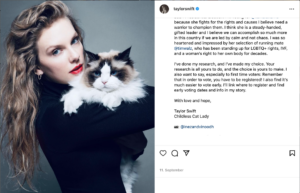
Celebrity politics
Celebrity endorsements are no new trick in politics – and have been embraced by both candidates this election cycle. This summer, Harris gained not only Charlie XCX’s endorsement but that of even bigger players in American pop culture like Bruce Springsteen, Olivia Rodrigo, and, perhaps the biggest star in the world right now: Taylor Swift.
Trump’s campaign, on the other hand, has largely been endorsed by celebrities like entrepreneur Elon Musk, YouTuber Logan Paul, and American football wife Brittany Mahomes.
While it is unclear how much celebrity endorsements really move the needle in a presidential election, they do have an unquestionable mobilizing effect. The grassroots group ‘Swifties for Kamala’ now boasts over 130k followers on TikTok and has raised nearly 140,000 USD for the Vice President’s campaign.
Midwest Princess
But celebrity endorsements aren’t always straight-forward: After the selection of Tim Walz as Harris’ running mate, hats and t-shirts promoting the campaign quickly emerged in a camouflage pattern, reading “MIDWEST PRINCESS”, a play on both emerging artist Chappell Roan’s studio album The Rise and Fall of a Midwest Princess, and Walz’s background in the midwestern states of the US.
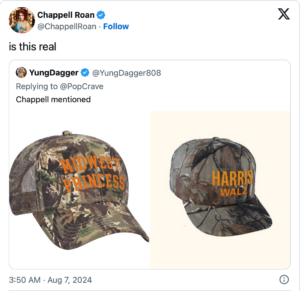
The merchandise has since proved popular, understood by some as ‘reclaiming’ camouflage and the Midwest for young Democrats (both generally associated with conservative politics, ed.). The inspiration behind the merchandise is Roan, a queer artist largely associated with the left. Until that point, she had not endorsed the Harris/Walz campaign, responding to the release of the merchandise with a Tweet (“is this real?”). After telling the Guardian that ’there is a problem on both sides (when it comes to Trump and Harris, ed.)’, mirroring many young, especially left-wing voters’ criticism of Harris’ previous political track record, Roan has since stated in a social media post that she was planning to vote for Harris.
Cats and dogs
In early September, Harris and Trump faced off in their first (and only) televised debate. While it didn’t lead to one candidate fully dropping out, it provided fuel for a lot of online discussion. Harris’ facial expressions alone initiated a flurry of memes, as she was hardly able to hide her disdain for the former president. However, the lines that certainly gained the most buzz post-debate came from Trump as he shot off claims of post-birth abortions and immigrants eating household pets. With the latter sparking a viral remix of the former president singing ‘They [immigrants, ed.] are eating the dogs, they’re eating the cats.’
Less than a week from the election, the online discourse surrounding the campaigns continues. It does, however, remain unclear if memes have translated into the mobilisation of young voters and whether Gen Z will tip the outcome. What remains clear is that it will be a close race between Trump and Harris: according to the New York Times, nationwide polling shows a margin of less than 1 per cent between the candidates. But while election day is still anyone’s game, what remains clear is that we can rely on Gen Z coping through niche internet content.



